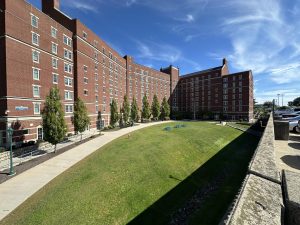Living in Poverty
March 1, 2020
If you were not born into poverty, you may not realize it, but your brain can.
Everyday people, like myself, often take our nonstop working brain for granted. However, people living in poverty are facing difficult situations that can cause long term effects and these impacts start during childhood.
According to The Effects of Poverty on Childhood Development Study, conducted by the department of psychiatry at Washington University, a smaller hippocampus and amygdala were detected in five to 17-year-olds living in poverty.These two regions of the brain – hippocampus and amygdala – are involved in stress regulation and emotion processing, which later can become problematic.
In a large community sample, findings from the study also showed smaller hippocampal grey matter volumes amongst children who were in a lower socioeconomic status.
Think about the last time you had to buy groceries or college textbooks. If you’re anything like me, having to open your wallet and part with a couple hundred dollars is an irritating, stressful time.
But if you are living in poverty, the stress becomes more intense. Finding a meal, let alone groceries, is a whole different issue. Getting a basic education in and of itself can be a hard step and college might not even be an idea that can be fathomed by some due to their circumstances.
Living in poverty halts everyday tasks that one takes for granted such as getting an education, food security and keeping up with good hygiene.
My stress is not the same.
Children experiencing increased stress, known as a causal factor, are more likely to have brain developmental issues, according to the article Childhood Poverty, Living Below the Line, published by the American Psychological Association.
The article states that stress can lead to “adverse changes in the cardiovascular system, the immune system and the neuroendocrine and cortical systems which impacts learning and decision making.”
The problems involving stress do not stop there. For parents living in major poverty, it can be especially stressful which can be translated amongst their children.
“Poverty impacts children’s development indirectly through direct effects on parents,” Living Below the Line article states.
This can both impair parenting practices and cause mental health issues down the road.
Another issue to take into consideration is living conditions. I was lucky enough to grow up in a very small town in which I felt safe. I could walk down the street to a friend’s house and pass by a soccer field and watch little kids kick a ball; smiles gleaming and parents roaring with happiness.
Unfortunately, not everyone has this privilege, and where I grew up is another factor I don’t think about every day or appreciate nearly enough. I am sure anyone else who has grown up in a similar situation wouldn’t think twice about it. But for those who are in an inner-city, where how they walk, who they associate themselves with, and how they dress is… – the list is endless – these things matter every single day. These small things can sometimes result in a life or death situation.
Growing up with everyday stressors such as exposure to crime, low family income, discrimination and limited access to health care and low socioeconomic status make individuals highly susceptible to physical and mental disorders, academic struggles in school and low IQ scores, according to Martha Farah, a University Pennsylvania professor.
Of course, this is not the case for everyone.
But I hope you take this into consideration the next time you are close to someone who cannot read as fast as you or calculate math problems as quickly. Nobody truly knows what the person across from them is going through.





